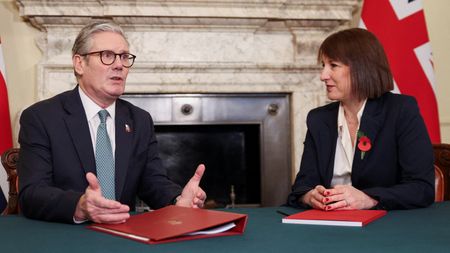By Nidal al-Mughrabi and James Mackenzie
CAIRO/JERUSALEM (Reuters) -Palestinian militant group Hamas announced the names on Friday of four Israeli female soldier hostages to be released in exchange for Palestinian prisoners in the second swap under the ceasefire deal in Gaza.
Karina Ariev, Daniela Gilboa, Naama Levy and Liri Albag, all members of a military surveillance unit posted near to Gaza when Hamas’ Oct. 7, 2023 attack occurred, would be released on Saturday, the group said.
The exchange follows the release on Sunday, the ceasefire’s first day, of three Israeli women and 90 Palestinian prisoners, the first such exchange in more than a year.
Prime Minister Benjamin Netanyahu’s office on Friday confirmed that the list had been received from the mediators but did not disclose the names on it. Israel’s response would be presented later, it said in a statement.
Israeli media said that the list was not in line with the original agreement between Israel and Hamas. The reports said a civilian, Arbel Yehoud, had been expected to be on the list.
Israel’s health ministry said hospitals were being prepared to receive the hostages, indicating that the exchange was expected to go ahead.
Video of the four as well as another soldier after they were captured at the Nahal Oz military base was broadcast on Israeli television last year. Their families had given permission for the airing in a bid to increase awareness and build pressure to get them back.
In the six-week first phase of the Gaza ceasefire, Israel has agreed to release 50 Palestinian prisoners for every female soldier released, officials have said. That suggests that 200 Palestinian prisoners will be released in return for the four soldiers.
The Palestinian Prisoners Club, a group that represents Palestinian detainees in Israeli jails, said the Red Cross had been told to be at Ofer prison in the occupied West Bank early on Saturday. Some of the prisoners will be released in the West Bank and some are expected to be deported.
The Hamas prisoners media office said it expected to get the names of 200 Palestinians to be freed on Saturday. It said the list was expected to include 120 prisoners serving life sentences and 80 prisoners with other lengthy sentences.
After the release Sunday of hostages Romi Gonen, Emily Damari and Doron Steinbrecher and the recovery of the body of an Israeli soldier missing for a decade, Israel says 94 Israelis and foreigners remain held in Gaza.
PHASED AGREEMENT
The ceasefire agreement, worked out after months of on-off negotiations brokered by Qatar and Egypt and backed by the United States, halted the fighting for the first time since a truce that lasted just a week in November 2023.
In the first phase, Hamas has agreed to release 33 hostages in exchange for hundreds of Palestinian prisoners held in Israeli jails.
In a subsequent phase, the two sides would negotiate the exchange of the remaining hostages and the withdrawal of Israeli forces from Gaza, which lies largely in ruins after 15 months of fighting and Israeli bombardment.
Israel launched the war following the Hamas attack on Oct. 7, 2023, when militants killed 1,200 people and took more than 250 hostages back to Gaza, according to Israeli tallies. Since then, more than 47,000 Palestinians have been killed in Gaza, according to health authorities there.
The release of the first three hostages on Sunday brought an emotional response from Israelis. But the phased release has drawn protests from some Israelis who fear the deal will break down after women, children, elderly and ill hostages are freed in the first phase, condemning male hostages of military age whose fate is not to be resolved until later.
Others, including some in the government, feel the deal hands a victory to Hamas, which has reasserted its presence in Gaza despite vows of Israeli leaders to destroy it. Hardliners, including Finance Minister Bezalel Smotrich, have demanded that Israel resume fighting at the end of the first phase.
Most of Hamas’ top leadership and thousands of its fighters have been killed, but the group’s police have returned to the streets since the ceasefire began.
(Reporting by Nidal Al Mughrabi in Cairo and James Mackenzie in Jerusalem. Additional reporting by Enas Alashray and Yomna Ehab in Cairo;Editing by Peter Graff, Alison Williams and Cynthia Osterman)











